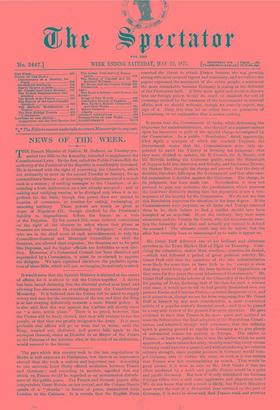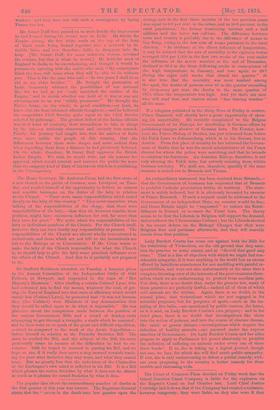Mr. Grant Duff delivered one of his brilliant and elaborate
speeches in the Town Market Hall of Elgin on Thursday. Criti- cising the exhaustion, rather than reaction,—reaction he denied, —which had followed a period of great political activity, Mr. Grant Duff said that the members of the late Administration were likely for some time to have little to do, "except to show that they could form part of the least factious of Oppositions, as they were for five years the most laborious of Governments." Mr. Grant Duff opposed the scheme of the Chancellor of the Exchequer for paying off Debt, declaring that if the tune for such a scheme ever came, it would not be till we had greatly diminished even our present Excise and Customs D uties,—a rather dangerous view, and as it seems to us, though we are far from supposing that Mr. Grant Duff is biassed by any such consideration, a most convenient article of a popular orator's financial creed,—and then he passed to a very able review of the present European situation. He gave evidence to show that France is far more quiet and inclined to trust the future since the final adoption of the Republican Consti- tution, and admitted, though with reluctance, that the military spirit is gaining ground so rapidly in Germany as to give plenty of substantial reason for anxiety in Europe. His advice to France,—at least we gather that it was the advice which he most approved.—was to reduce her army, thereby removing every excuse Germany could have for a quarrel, and without reducing her relative military strength, since popular pressure in Germany would com- pel Germany also to reduce the army, so soon as it was certain that France was not contemplating au attack. That would be good advice, if it were as sure as Mr. Duff thinks it that the effect produced by a weak and pacific France would be a quiet and pacific Germany. But how if it only stimulated the German Foreign Office into a still more aggressive and imperious tone ? We do not know that such a result is likely, but French Ministers must count the cost of a dictatorial tone assumed on the part of Germany, if it were to occur and find France weak and growing
weaker; and they dare not risk such a contingency by laying France too low.



































